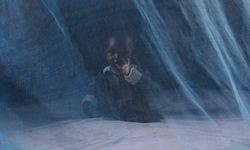 (Source: Flickr/USAID Kenya) (Source: Flickr/USAID Kenya) Laura Pearson The evidence for climate change is compelling: during the last decade we have experienced eight of the warmest years on record. Global surface temperatures are predicted to rise above the 2⁰C threshold – and possibly dramatically so – within less than a century. But what does that mean for health? I recently attended a discussion by speakers Hugh Montgomery, Ian Roberts, Anthony Costello and David Satterthwaite, experts on different aspects of health in a warming world. They discussed current climate science, current and projected impacts on health – through extreme events and threats to shelter, food and water security, ecosystem and economic stability – and health co-benefits. Vector-borne diseases, which are transmitted by insects and mites or ticks, including serious diseases like malaria and tick-borne encephalitis, were not discussed much, but they have strong associations with the climate and are clearly an important influence upon global health. They account for 16% of the estimated total global disease burden for all communicable diseases and the majority of Neglected Tropical Diseases (NTDs) – diseases that affect a billion people, yet receive comparatively little attention or funding. Also of importance is how climate change can impact directly upon these diseases, because of their strong associations with poverty and the effects climate change has upon economic stability. Climate also impacts upon food and income generated by livestock, via diseases such as African Horse Sickness and Bluetongue, therefore further affecting economic stability. The predicted escalations in temperatures, precipitation and humidity will influence both intermediate host and vector ecology and biology, and also interact with other factors like urbanisation and increasing volumes of global trade, making the influences on transmission dynamics very difficult to predict. What is clear is that they are potentially very large, making a strong case for a precautionary approach. In a warming climate, a number of mosquito species can develop and reproduce faster, which can increase population growth and biting rates, and therefore the transmission of diseases they carry, such as malaria, dengue and yellow fever. Rainfall is also important. During the 1997-1998 El Niño, precipitation shifts led to explosions in mosquito populations, evoking epidemics of the most dangerous species of malaria. Areas that receive less rain could also have negative impacts on vectors: Anopheles funestus mosquitoes for example virtually vanished from Senegal due to reduced precipitation rainfall, resulting in a 60% reduction in malaria prevalence during 1970-2000 in Senegal. However, changes in ecosystems which negatively impact one vector species can benefit others. In a dryer, warmer environment, a species of Tsetse fly which thrives in dry savannah regions and is responsible for spreading a particularly virulent strain of sleeping sickness, is predicted to increase. Indirect environmental factors Changing ecological factors, including but not limited to climate, can create new selective pressures on vectors: for example, deforestation and increasing urban sprawl have most likely contributed to the vector for Chagas disease, becoming adapted to feed on the blood of encroaching human populations. It has shifted from a diet primarily involving wild animals to one where it feeds primarily upon people in their own homes, and so increasing disease prevalence. And the problem is not confined to developing countries: warmer winters have enabled the Asian tiger mosquito to establish itself in Italy, presenting serious potential risks of dengue. Tick-borne encephalitis and Lyme disease could also be supported throughout Europe by thriving tick populations. In addition, globalisation and increasing rates of air travel put us all at risk of emerging and re-emerging infectious diseases even if they first manifest themselves in populations on the other side of the world. The short- and long-term consequences of climate change will ultimately influence the ecology, transmission, dispersal and evolution of a range of vector-borne diseases across the globe in important ways. These will interact with many other impacts, such as economic effects and population displacement to result in direct and indirect health impacts. The most obvious corollary of this story is the need for rapid and urgent action to mitigate climate change. Nevertheless, we also urgently need to prepare more effectively for unavoidable infectious disease risks associated with climate change: modelling to predict potential threats, vigilant surveillance and epidemiology, and adequate, well-targeted funding will all be essential for effective and efficient disease prevention and control strategies. Originally published at http://www.rtcc.org/2013/05/31/time-to-protect-against-climate-aided-spread-of-disease/
0 Comments
Your comment will be posted after it is approved.
Leave a Reply. |
Details
Archives
February 2019
Tags
All
|
 RSS Feed
RSS Feed
